How a Working Mom Trains for the Hardrock Hundred
Yitka Winn on the joys and challenges of prepping for tough mountain hundreds while working full time & raising a toddler
This week’s post spotlights someone you’ll want to learn about if you’re a runner, writer, and parent of a young child. Next week, on April 18, I’ll host the monthly online meetup for paid subscribers, which will include author/ultrarunning champ . If you’d like an invitation to this monthly group chat and occasional bonus posts, please consider upgrading your subscription to the supporter level.
The melting snow and sprouting greenery here in the San Juan Mountains boost my eagerness for high-country trails to reopen and for training to shift to high gear. I mentioned my race lineup in an earlier post1 but haven’t shared a highlight of this summer: I’ll pace and crew
in the Hardrock Hundred July 12 - 13.Yitka’s entrance in Hardrock soothed my disappointment on lottery day last December. We’ve both been in seven Hardrock lotteries spread over about a decade. Yitka had 64 tickets in the lottery, and I had 128 (my ticket count doubled thanks to volunteering)—both of us going for the precious 20 spots in the “female never” pool against hundreds of applicants who also hold multiple tickets from years of trying. (It’s nuts, this multi-year process of qualifying and applying to get into this storied race through their lottery, but that’s another story.)
I let out a whoop of “yes!” when I saw Yitka’s name pulled.
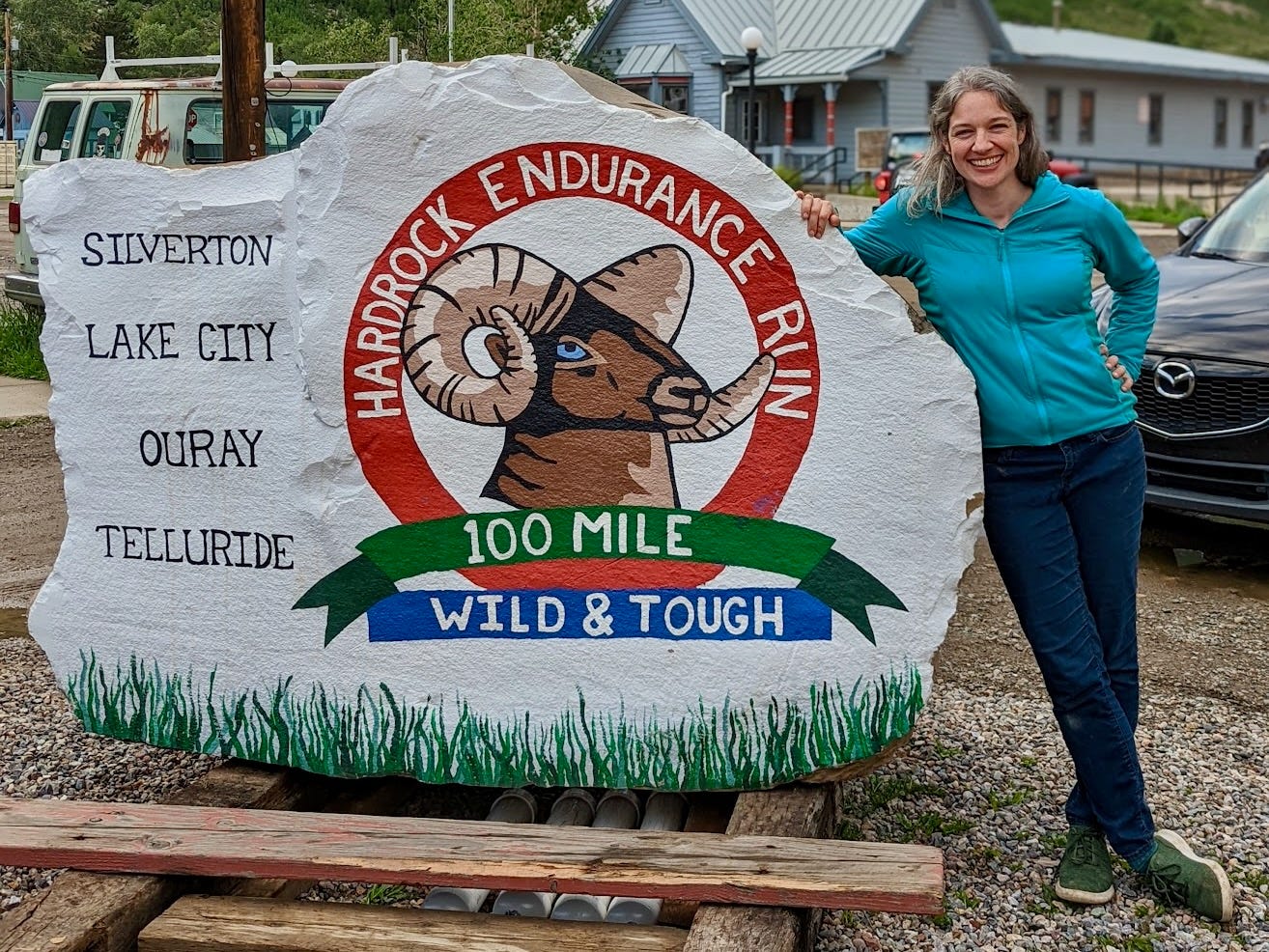
She is so well-qualified and deserving, and so accomplished yet humble, that I’m overjoyed she got a spot. I’m also gratified to pace her for the section from Ouray to Animus Forks. Pacing and crewing serve as a quasi-apprenticeship to get Hardrock-ready and to plug into the event’s community.
So let me tell you about this special person and how she plans to train and race while working full time, parenting her almost 4-year-old daughter, and also publishing her Substack Runners Who Write in her pretend spare time. I wish more new runner-moms and their partners could see and follow the example she sets of prioritizing her running (but putting quality over quantity) and having a supportive spouse.
Yitka Winn, 36, is something of a dark horse competitively, in part because she’s not sponsored (or rather, she’s “sponsored by my day job,” she laughs), and she downplays her running results on her Instagram in favor of pictures that show her daughter and nature. But she got some well-deserved recognition last July when she won the Cascade Crest 100—for the fourth time (!)—topping a podium with better-known ultrarunners Amelia Boone and Corrine Malcolm finishing second and third.
We met a decade ago, when I wrote frequently for Trail Runner, and Yitka sometimes edited my articles as the magazine’s associate editor. She and I also alternated writing the magazine’s first-person column, and we’d swap emails about our writing along with smatterings of gossip. I trusted her as an editor, and even though she was only in her mid-20s, she struck me as an older soul. We hit it off in spite of our 18-year age difference.
Yitka moved to Telluride and nearby Ridgway for a couple of years while writing and editing, and we overlapped when I moved here. In the summers of 2015 and 16, she introduced me to several local trails and encouraged me to run local races.
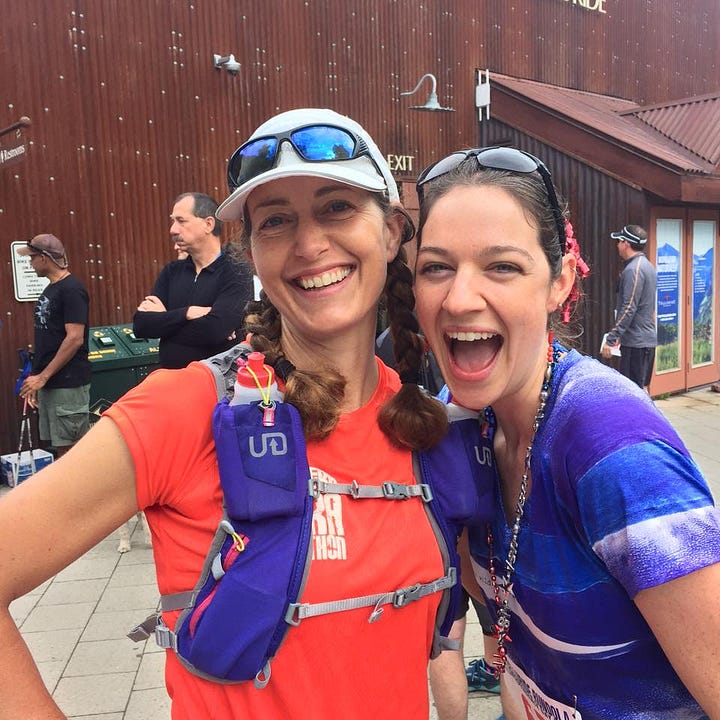
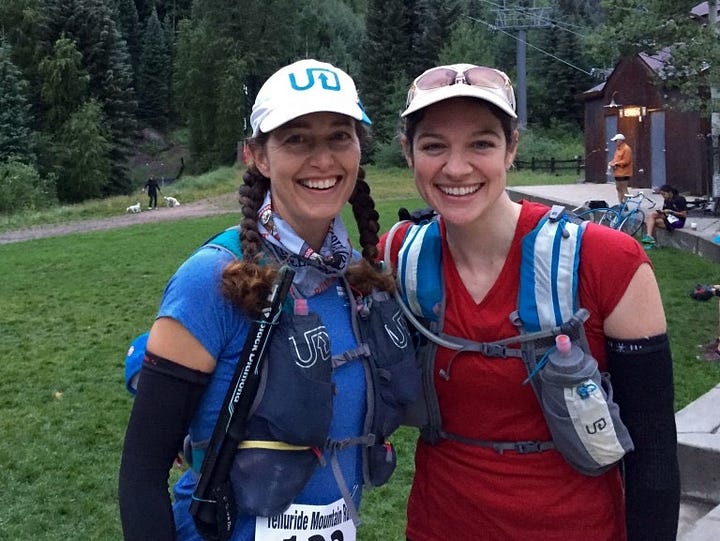
She got married five years ago and settled in Renton, a suburb south of Seattle, with her husband George Orozco and his three children, who are now 15, 18, and 19. Yitka transitioned to being a stepmom and gave birth to their daughter, Sahale, three-and-a-half years ago. She works full time as an editor of product copy for REI.
We connected last Saturday by Zoom to talk about how becoming a mom has affected her running and writing, and how she plans to prep for and race Hardrock with her daughter in tow.
She Zoomed with me while sitting in her “closet-office,” which is actually the closet of her daughter’s bedroom. She converted it into a cozy space with a window, a stand-up desk, and a mural of a forest on the back wall. She makes the small space work, like so many other logistics in her working-mom-ultrarunner life.
I start by asking, what’s a typical week like for you?
“I work a 7 to 3:30 schedule Monday to Friday. Since the pandemic, I’ve been able to work from home mostly, so that’s been really helpful, and once I had a child, my boss let me shift my hours earlier because my husband George works 3 to 11:30 at a hospital. He takes care of Sahale in the mornings, when I’m working, and then I immediately go on mom duty when I get done with my workday and he goes to the hospital. Running gets crammed in on lunch breaks, and the YMCA has been life-changing for me because they have childcare for up to two hours, so I do a lot at the gym and on the treadmill. … My stepkids are usually with us every other weekend, and they babysit for us. On the weekends, George and I take turns getting our runs in.”
The fact you’re training for and winning 100-milers with a workweek like that kind of blows me away, I tell her. Can you offer more insight into how you structure your life to be able to do this, and also, what you give up or what you say no to?
“My house is messy. Actually, it's not even that messy because my husband is wonderful and does a lot of housework, so I recommend a partner who does housework. I don't cook nearly as much as I used to. And I'm not doing a ton of writing and don't have time for journaling at the moment.”
She says it helps greatly that her partner, who’s her former running coach, understands and supports her passion and interests. He put his racing on hold when their daughter was born, but he’ll train to race Cascade Crest 100 this summer, his first 100-miler in five years.
When Yitka got married and then pregnant, she said, “I’m not giving up hundreds,” and she ran and won Cascade Crest 100 in 2021 after training postpartum (an experience she shares in this blog post, which is a great read for any new parent).
I ask why she feels so strongly about keeping her commitment to her sport while working full time as a new mom. Child-raising plus work keeps many women from tackling tough mountain hundreds, we noted, which is partly why women are underrepresented in ultrarunning, especially at the 100-mile distance.
“Running will always be important because of the physical need—exercise keeps us healthy—and the mental need; my mental health suffers when I don't run. There’s also the social need. I do a lot of running and training alone, but I try to run with people whenever I can because it's a nice social opportunity. It’s community. So it just sort of feels non-negotiable. And hundreds in particular are my favorite race distance. I like having a big goal to get out and run.”
But how do you fit in the time to log the volume needed to train for these extra-tough races? Her secret, she reveals, is prioritizing quality over quantity and logging relatively low-volume weeks.
“George coached me from 2017 to 2019, and as a coach, his philosophy is lower mileage and you don't need to go out and do long runs every weekend. I didn't quite buy into that at first because I was like, miles are so important and back-to-back runs and all of that. Bu he's like, you can get most of your training done in an hour a day during the week, and then if you can get out for a three-hour run on the weekends, great. That's how I trained for races in 2017 to 2018, and I was like, OK, this is working pretty well.” [Yitka earned numerous podium finishes from 2017-19 including wins at the 2017 Fat Dog 120 and Lumberjack 100, and wins at the 2018 and ‘19 Cascade Crest 100.]
“I feel like I can still maintain that [level of training] because I have an hour lunch break every day, so I can do my hour then, or I can do an hour on the treadmill at the YMCA in the evening. Then I can do a few hours on the weekends. So my training doesn't look that different now than it did before” having a baby.
“I try to cram in a lot of harder workouts in the time that I have. If I know I have limited time, I'm more likely to do one hard workout and then not do anything for two days, rather than try to get in an easy run for three days in a row.”
What does your peak training volume look like leading up to a hundred?
“Forty to 50 miles a week, and then year round, pretty much 30 to 40 is what I do. But I also do a lot of weight lifting. That’s another nugget I got from George—he’s big on strength training. It’s been super beneficial for me, and will be even more so for Hardrock training. The longer you’re out there, and the greater percentage of hiking you’re doing versus running [which is the case with Hardrock, where much of the route is un-runnable due to steepness and terrain], the more important strength training is.”
I ask, can you talk more generally about how becoming a mom affected your relationship to running? I imagine in some ways it made you stronger, in other ways it made you compromise your training.
“Becoming a mom has made me appreciate running even more because of all the ‘bang for my buck’ it gives me, which I value all the more now that my time is so limited. Motherhood encourages me to be more efficient in my training, more appreciative of the opportunity to run, and maybe most importantly, it has helped get my ego out of the sport; I feel like I have less to prove now than I did five years ago.
“In 2022, I didn't race at all, or honestly even run much, because I just didn't feel like it. I wanted to hang out with my family and work on my memoir. It was great! After a year off, I was definitely eager to train hard and race again.
“When I was in my 20s, I thought I might want to try to be a sponsored athlete someday. When I became a mom, I lost interest in pursuing that, in part because the way George and I are raising our daughter—without daycare/nanny/grandparent support, while both of us work full time—which would make it impossible for me to have to travel regularly for races or other obligations. I don't feel like I'm missing anything, though. I love running our local trails and races here, and only doing the occasional destination race if and when the lottery gods give me the opportunity.
“Plus, I wouldn't enjoy the pressure I know I'd feel if money were tied up with my running performance. That's a lesson I've learned over the years with both running and writing: keeping money and ego out of these things as much as possible increases my enjoyment of them tenfold.”
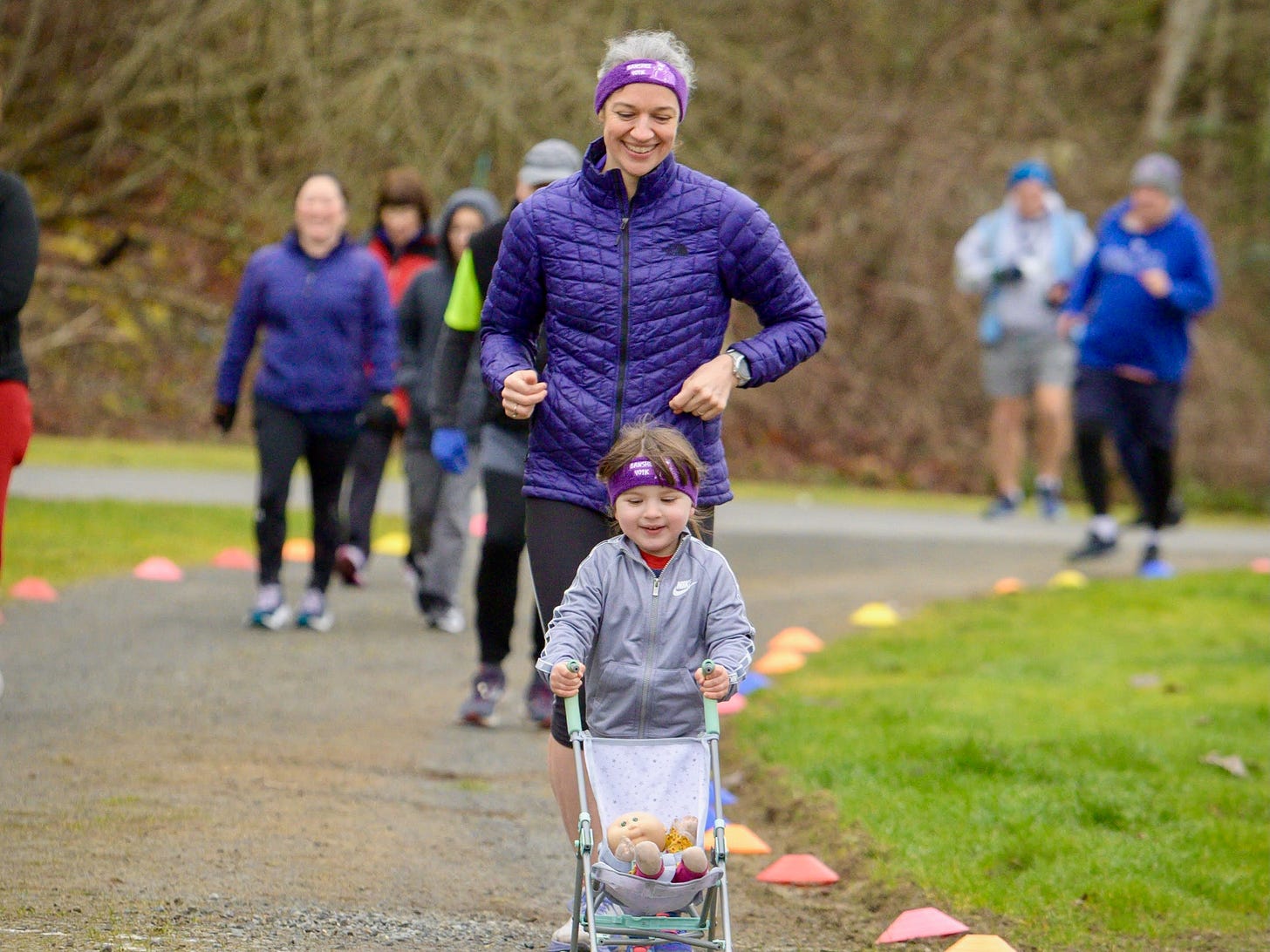
I ask Yitka to talk a bit more about Hardrock and the cost and sacrifice to run it. There’s been a lot of talk over the past decade-plus about the event’s low female participation (typically 10 to 20 percent of the entrants’ field), which is due largely to the mechanics of the event’s lottery; it gives veterans of the event an advantage in the draw, and those veterans are predominantly male. But it’s also due to fewer women than men running the lottery-qualifying races, and the fundamental reality that child-raising responsibilities tend to fall more on the mom.
How has she overcome these perceived barriers to entry—running 100-mile qualifying races every two years to persist in the lottery—and now, how will she get out here to train and execute the race?
Yitka says that in her case, the challenges to entry have less to do with gender and more to do with socioeconomic constraints. She and George are on a budget, and she notes that entry fees for ultras have risen sharply in recent years. The travel involved with running a lottery-qualifying race adds to the expense. A main reason she has run Cascade Crest 100 for multiple years as her Hardrock qualifier, she says, is because it’s within easy driving distance of her home, and she can sleep in her own bed the night before rather than pay for travel and lodging.
“There's a lot of associated expenses with these experiences. For me, I'm like, OK, I've spent a decade trying to get into this race; it’s a big deal. But this will probably be the only year I ever run Hardrock. Even if I were given the opportunity to run it again in the future, it’s not a reasonable expense for me on a regular basis.”
She describes how her Hardrock entry recently prompted her to replace her old car with a more reliable vehicle, so she can drive to Colorado this summer without fear of breaking down midway. She and her daughter will drive to the San Juan Mountains about a month before the event, to train and acclimate in the altitude—without George, who needs to stay back to work—and she will camp to save money (as well as stay at my home part of the time). She needs to cut back her work hours and use paid time off to train in Colorado, and she also needs to line up and pay for childcare while she’s on the trail. The whole endeavor is a massive logistical undertaking and hit to her budget.
Yitka will rely on friends to babysit and on community drop-in childcare while she’s in Colorado. “It's been such a gift when I have had friends like you who offer to step in and make things possible that are hard to ask for,” she says. “I guess my plug here, for people who don't have kids, is I can't even describe how amazing it is to offer to help your friends who do have kids. As a parent, it’s really hard to ask for [that help] and accept it.”
With all you’re handling, I ask her, why did you add a Substack newsletter on top of it all? She laughs and says her boss—who, she adds, has been a big source of support for her training and running—jokingly asked her the same thing.
She launched
last December, an outgrowth of her prior blog, with a focus on bringing together and supporting other runner-writers. She wrote in her first post: “In three different places I’ve lived, I’ve started beginner-friendly running groups to help change the minds of people who think running isn’t for them. I’ve often lamented that I’ve never found, or known how to create, the same sense of belonging in the literary world. But here’s the truth: ‘Being a writer’ doesn’t have to involve publication or literary accolades (just as ‘being a runner’ does not require racing competitively, or being able to run a certain distance or pace).”She adds that she missed the personal writing we used to do in Trail Runner’s first-person column. Her newsletter is “a reason to write, even when life is busy. And in a less selfish way, I feel like building community. A lot of the friends I made in recent years out here are runners and have this little creative part of themselves, but it's in the background because and they're like, running is my focus. I want to help nurture that creative side of them.”
Thank you, Yitka, for building this runner-writer tribe! And I can’t wait to help you nail Hardrock in July.
Yitka’s beer + trail guide book
About six years ago, Yitka got hired to author Beer Hiking Colorado, a guide to 50 craft breweries in our state and hikes around them. (I can’t imagine a better freelance assignment.) Order a copy through the link above. It’s a great guide in terms of its content and graphics.
I asked Yitka, if you could spend time traveling around Colorado again, which three hikes from the beer book would you want to revisit? She replied:
The Willow Lake Trail in Crestone, “a wild, mystical journey. Aside from being located in the heart of the mountains, this tiny town and surrounding flatlands are home to dozens of spiritual organizations, ashrams, monasteries, stone labyrinths, healing centers, and other sacred sites.”
Fourmile Falls in Pagosa Springs, “in the belly of a steep valley, flanked on all sides with prominent rocky bluffs and hoodoo-like outcroppings.”
Copper Lake in Crested Butte, “a highlights reel of some of the best scenery the basin has to offer, from waterfalls to lakes to wildflowers.”
A few other reading/podcast recs:
“How to Train Hard with a Family and Full-Time Job”: My friend Garett Graubins wrote this article for Trail Runner in 2015 when he was training for Hardrock in the midst of parenting his young son, working full time, and finishing an MBA. Like Yitka, he made a lower-volume training plan work. His story has good practical tips for extra-time-pressed ultrarunners.
“Pondering Moab, the Old West vs. New West, and cows vs. condos”: a thoughtful essay by Jonathan P. Thompson on his Substack
, a newsletter I recommend for news and commentary about The West’s environment, development, and culture.- podcast episode 106, “How to Step Out of the Self-Loathing Spiral”: I really like this podcast and newsletter about the creative process by and my favorite poet, . This inspiring episode deals with screwing up and starting over.
“Q&A with Jade Belzberg”: Yitka talked to another runner/writer I admire,
, for her most recent newsletter post.
My race lineup: I’m signed up for Leona Divide 100K in two weeks, Bears Ears 50M in June, Never Summer 100K in July, and Telluride Mountain Run 13 in August, which all serve the purpose of building endurance for my “A” goal of the Grand to Grand Ultra weeklong self-supported stage race in September. Then, in November, the new Colorado 24-Hour Run.
With so much out there worth reading, I greatly appreciate you taking the time to read my newsletter. If you’d like to support my writing but would rather not commit to a paid subscription, please consider a small donation to this virtual tip jar.



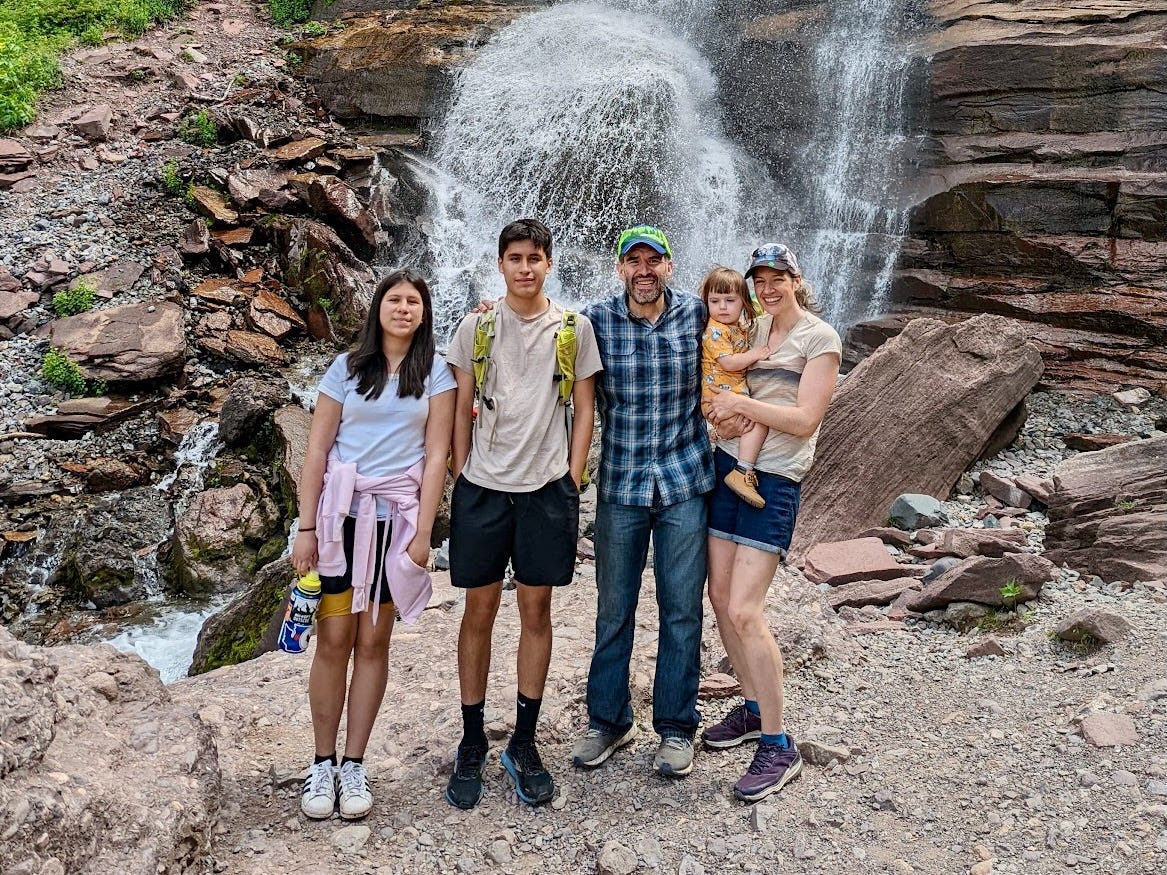
Thank you so much for doing this profile. Yitka is definitely a local legend here in the PNW and also a great writer. Thanks to her I got to know about your Substack too and I’ve been subscribed to the newsletter for a while. Yall are awesome!!
Great interview Sarah ! Really appreciate her training style as I never feel like I am running "enough" miles. I also recently discovered Yitka's substack and really enjoy it. And so excited for Katie Arnold next week!!!!!